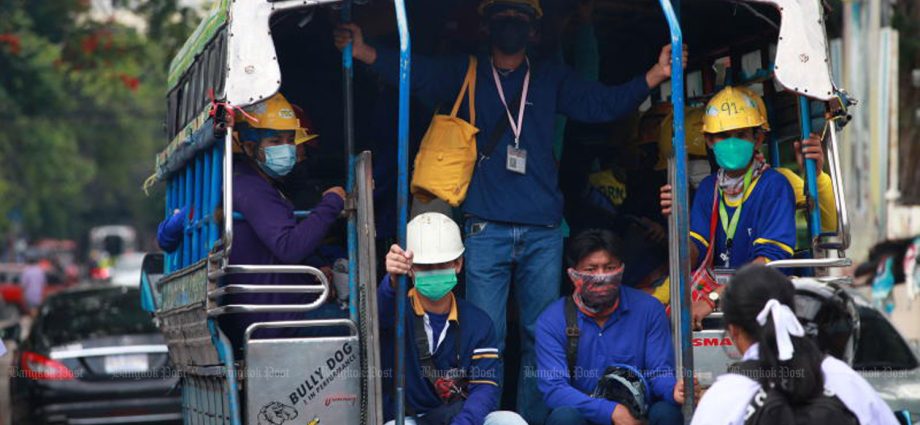Figure falls short of Pheu Thai’s promises

The daily minimum wage for Thai workers nationwide is set to rise from Jan 1, 2024 — and the new rates will vary from province to province, ranging from 330 to 370 baht, according to the labour ministry.
The tripartite committee on minimum daily wages, comprised of representatives from the business sector, labour and the government, approved the new rates on Friday.
The current rates are between 328 to 354 baht. The increases in the daily minimum wage will range from 2 to 16 baht, or an average of 2.4%.
Workers in Phuket will obtain the highest daily wage of 370 baht, up from 354 baht now, while workers in Narathiwat, Pattani and Yala will receive the lowest wage of 330 baht, up from 328 baht.
Workers in Bangkok, Nakhon Pathom, Nonthaburi, Pathum Thani, Samut Prakan and Samut Sakhon will receive the new daily wage rate of 363 baht, up by 10 baht from the current 353 baht per day.
Speaking after chairing the committee’s meeting, which lasted five hours on Friday, Pairoj Chotikasathien, permanent secretary for the Labour Ministry, said that the wage hikes will be presented to the cabinet for acknowledgement before it is announced in the Royal Gazette.
The new wage rates will then take effect on Jan 1.
“This adjustment will allow workers to achieve a standard of living that is based on economic conditions and is suitable for businesses,” Mr Pairoj said.

He also explained that 370 baht has been approved for workers in Phuket because the island province is unique in that there is little farming in the province and most labourers work in the tourism sector there. Furthermore, the cost of living in Phuket is higher than that of other provinces.
“Therefore, the new daily wage of 370 baht for Phuket is appropriate,” Mr Pairoj said.
However, the new daily wage falls short of the level promised by the Pheu Thai Party during its election campaign earlier this year.
This wage adjustment has attracted more public attention than usual after the ruling Pheu Thai Party had previously announced a policy to raise the minimum wage to 400 baht per day, a promise the party made during the last general election.
However, Labour Minister Phiphat Ratchakitprakarn last month poured cold water on that idea, saying wages would probably rise by only 2% — in line with the current low inflation.
The last wage increase approved by the tripartite committee was 5%, in October last year.
Pheu Thai’s plan for a big wage hike had rattled businesses that feared it would push up operating costs and make the country less competitive for investors at a time when the economy is underperforming.
Mr Pairoj said there would be another wage increase in 2024, when the committee would seek to raise the level to 400 baht.
Mr Phiphat said after the meeting on Nov 27, a sub-committee under this main wage committee submitted wage hike figures proposed for each province before a screening panel. He said that five provinces, including Phuket, did not request wage hikes.
“This was unacceptable and unfair to workers. The daily wage should be raised in every province and vary from province to province depending on their respective economic conditions.
“Provinces where the government is trying to stimulate the economy should receive high wage hikes. I believe the daily wage of 400 baht is expected to be approved for provinces which enjoy healthy economies in line with the government’s policy,” he said.
“If things get off to a good start next year, the daily wage is expected to rise further to 600 baht in 2027,” the minister said.
Atthayuth Leeyawanich, president and chairman of the Employers Confederation of Consumer Goods and Services, said that the new wage rates are appropriate and acceptable to employers as they were screened by a panel of academics before being submitted to the tripartite committee.
He also noted that the increase of 2 baht is only for three provinces while most provinces will still receive an increase of 8-10 baht.
Veerasu Kaewboonpun, an employee’s representative on the committee, said he was satisfied with the new rates.
The new rates are high in some provinces and low in other provinces, depending on local economic conditions, he said, adding that the new rates are intended to maintain employment given that some employers may replace workers with machinery which will lead to lay-offs.

